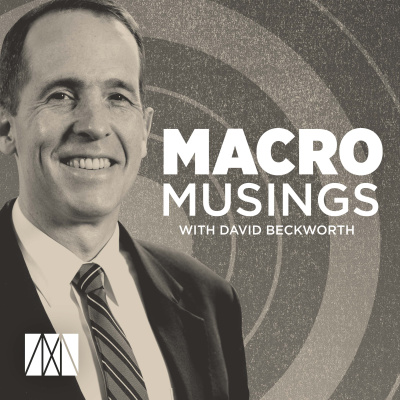Synopsis
Hosted by David Beckworth of the Mercatus Center, Macro Musings is a podcast which pulls back the curtain on the important macroeconomic issues of the past, present, and future.
Episodes
-
David Andolfatto on a Standing Repo Facility, Safe Asset Shortage, and the Fed's Low Inflation Problem
06/05/2019 Duration: 59minDavid Andolfatto is a vice president of the St. Louis Federal Reserve Bank and is published widely in the field of monetary economics. He also blogs at MacroMania, and has recently published on issues such as the zero lower bound, the symmetry of the Fed’s inflation target, a new standing repo facility, and MMT. David is a returning guest to Macro Musings, and he joins the show today to talk about these issues. David and David also discuss the safe asset shortage, average and flexible inflation targeting, and the legal, political, and economic restraint surrounding negative interest rates. Transcript for the episode: https://www.mercatus.org/bridge/podcasts/05062019/safe-assets-symmetric-inflation-and-mmt David Andolfatto’s Twitter: @dandolfa David Andolfatto’s blog: http://andolfatto.blogspot.com/ Related Links: *Is Low Inflation Really a Mystery?* by David Beckworth https://macromarketmusings.blogspot.com/2019/04/is-low-inflation-really-mystery.html *Why the Fed Should Create a Standing Repo Fac
-
Alexandra Scaggs on Bond Markets, the Treasury Yield Curve, and MMT
29/04/2019 Duration: 51minAlexandra Scaggs is a senior writer at Barron’s covering financial markets with a special emphasis on bond markets, and she previously wrote news and commentary for the Financial Times and for Bloomberg. Alexandra joins the show today to talk about the current state of bond markets and what it means for the economy. David and Alexandra also discuss corporate debt, the inversion of the treasury yield curve, and the lasting impact of the modern monetary theory debate. Transcript for the episode: https://www.mercatus.org/bridge/podcasts/04292019/bond-markets-and-macroeconomics Alexandra’s Twitter: @alexandrascaggs Alexandra’s Barron’s profile: https://www.barrons.com/authors/8576 Related Links: *Negative-Yielding Bonds Top $9 Trillion as Growth Worries Return* by Adam Haigh https://www.bloomberg.com/news/articles/2019-03-14/negative-yielding-bonds-top-9-trillion-as-growth-worries-return David’s blog: macromarketmusings.blogspot.com David’s Twitter: @DavidBeckworth
-
Andrew Park on the Implications of Collateralized Loan Obligations
22/04/2019 Duration: 58minAndrew Park is a senior editor at S&P LCD and is one of the foremost experts on collateralized loan obligations and the leverage loan market. Andrew also writes daily on what’s going on in the collateralized loan obligations (CLO) market and his data is the basis for most of the reporting on this topic in the Wall Street Journal, Financial Times, and by many policymakers. He joins the show today to talk about CLOs and their implications for the financial system and, more generally, the economy. David and Andrew also discuss the leveraged loan market, the differences between CDOs and CLOs, and the Fed’s most recent rate hikes. Transcript for the episode: https://www.mercatus.org/bridge/podcasts/04222019/andrew-park-loans-financial-system-and-economy Andrew’s Twitter: @apark_ Andrew’s Forbes profile & archive: https://www.forbes.com/sites/spleverage/people/andrewparksp/#18bc9eb1102d Related Links: *Wall Street’s Billionaire Machine, Where Almost Everyone Gets Rich* by Tom Metcalf, Tom Maloney,
-
Eric Lonergan on Helicopter Drops and How to Improve Monetary Policy
15/04/2019 Duration: 56minEric Lonergan is macro hedge fund manager, and economist, and a writer. He has written for Foreign Affairs, the Financial Times, and has authored the book *Money (The Art of Living)*. More recently, Eric has also co-authored a new book called *Angrynomics*. He joins the show today to talk about how to improve policymakers’ responses to recessions. David and Eric also discuss helicopter drops, dual interest rates, and how governments can make monetary policy more direct. Transcript for the episode: https://www.mercatus.org/bridge/podcasts/04152019/how-respond-recessions Eric’s Twitter: @ericlonners Eric’s blog: https://www.philosophyofmoney.net/blog/ Related Links: *Money: The Art of Living* by Eric Lonergan https://www.cambridge.org/core/books/money/486535FC2BE6ADB342A82A668584AE71 *Fixing the Euro Zone and Reducing Inequality, Without Fleecing the Rich* by Eric Lonergan and Mark Blyth https://hbr.org/2015/01/fixing-the-euro-zone-and-reducing-inequality-without-fleecing-the-rich David’s blog: ma
-
Yair Listokin on the Convergence of Law and Macroeconomics
08/04/2019 Duration: 59minYair Listokin is a professor of law at Yale Law School and is the author of a new book titled, *Law and Macroeconomics*. He joins the show today to talk about the book as well as some of his new work. David and Yair also discuss sovereign wealth funds, the legal limits of central banks, and how to expand fiscal policy while making it more effective. Transcript for the episode: https://www.mercatus.org/bridge/podcasts/04082019/law-and-macroeconomics Yair’s Yale Law School profile: https://law.yale.edu/yair-listokin Related Links: *Law and Macroeconomics: Legal Remedies to Recessions* by Yair Listokin http://www.hup.harvard.edu/catalog.php?isbn=9780674976054 David’s blog: macromarketmusings.blogspot.com David’s Twitter: @DavidBeckworth
-
Bryan Cutsinger on Seigniorage and the Monetary Economics of the Civil War
01/04/2019 Duration: 58minBryan Cutsinger is an economist affiliated with Angelo State as well as Texas Tech University and recently published an article titled *Seigniorage in the Civil War South*. He joins the show today to talk about this article, the monetary history of the Civil War, and the economics of Seigniorage. David and Bryan also discuss how both the North and the South financed the war and why the South made some counterintuitive decisions in how they conducted monetary policy. Transcript for the episode: https://www.mercatus.org/bridge/podcasts/03292019/civil-war-and-economics-seigniorage Bryan’s website: https://www.bryancutsinger.com/ Bryan’s George Mason profile: https://economics.gmu.edu/people/bcutsing Related Links: *Seigniorage in the Civil War South* by Bryan Cutsinger and Joshua Ingber https://www.sciencedirect.com/science/article/abs/pii/S0014498318300470 *The Gold Standard as a Rule: An Essay in Exploration* by Michael Bordo and Finn Kydland https://www.sciencedirect.com/science/article/abs/pii/S0
-
Paul Tucker on Central Bank Independence and *Unelected Power*
25/03/2019 Duration: 01h02minPaul Tucker is a 33-year veteran of the Bank of England where he served as both a member and deputy governor of the Monetary Policy Committee. Currently, Paul is a senior fellow at Harvard and a chair at the Systemic Risk Council. He has also recently authored a book, *Unelected Power: The Quest for Legitimacy in Central Banking and the Regulatory State* and joins the show today to discuss talk about it. David and Paul also discuss central bank independence and justifications for the existence of a regulatory state as well as Paul’s “principles for delegation” criteria. Transcript for the episode: https://www.mercatus.org/bridge/podcasts/03252019/paul-tucker-central-bank-independence-and-unelected-power Paul’s website: http://paultucker.me/ Paul’s Harvard University profile: https://ces.fas.harvard.edu/people/001970-paul-tucker Related Links: *Unelected Power: The Quest for Legitimacy in Central Banking and the Regulatory State* by Paul Tucker https://press.princeton.edu/titles/11240.html David’s b
-
James Broughel on the Social Discount Rate
18/03/2019 Duration: 01h12sJames Broughel is a senior research fellow at the Mercatus Center and an adjunct professor of law at George Mason University Law School. James specializes in state and federal regulatory procedures, cost-benefit analysis, and economic growth. He joins the show today to talk about a recent symposium he hosted on the social discount rate; what it is, its uses, and the controversy surrounding how to measure it. David and James also discuss cost-benefit analysis in the regulatory world and why the social discount rate matters for policy. Transcript for the episode: https://www.mercatus.org/bridge/podcasts/03182019/discounting-future James’ Twitter: @JamesBroughel James’ Mercatus profile: https://www.mercatus.org/james-broughel Related Links: *The Social Rate of Time Preference and the Social Discount Rate* by Mark Moore and Adam Vining https://www.mercatus.org/system/files/moore_and_vining_-_mercatus_research_-_a_social_rate_of_time_preference_approach_to_social_discount_rate_-_v1.pdf *The Appropriate
-
Ryan Avent on Hyperinflation and the Fed’s New Dovish Direction
11/03/2019 Duration: 55minRyan Avent is an economics columnist with The Economist magazine and is a previous guest of Macro Musings. He joins the show today to talk about some of his recent columns including work on hyperinflation, the Green New Deal, and Fed policy. David and Ryan also discuss the growing popularity of Modern Monetary Theory, the Fed’s dovish change in direction, and why hyperinflation is so devastating to a nation’s economy. Transcript for the episode: https://www.mercatus.org/bridge/podcasts/03112019/hyperinflation-and-mmt Ryan’s Twitter: @ryanavent Ryan’s Economist profile: http://mediadirectory.economist.com/people/ryan-avent/ Related Links: *Hyperinflations Can End Quickly, Given the Right Sort of Regime Change* by Ryan Avent https://www.economist.com/finance-and-economics/2019/01/31/hyperinflations-can-end-quickly-given-the-right-sort-of-regime-change *Taking the Fed at its Word: Direct Estimation of Central Bank Objectives using Text Analytics* by Adam Shapiro & Daniel Wilson https://www.frbsf.o
-
146 – Michael Strain on the Current State of the Economy, the Green New Deal, and Populism on the Left and Right
04/03/2019 Duration: 01h21sMichael Strain is the director of economic policy studies at the American Enterprise Institute. Previously, Michael worked in the Center for Economic Studies at the U.S. Census Bureau and in the Macroeconomics Research Group at the Federal Reserve Bank of New York. He joins the show today to talk about recent developments in U.S. economic policy and some of his work on that topic. David and Michael also discuss the consequences of rising populism, MMT’s impact on tax policy, and the issues Americans should be most worried about. Transcript for the episode: https://www.mercatus.org/bridge/podcasts/03042019/populism-mmt-and-billionaires Michael’s Twitter: @MichaelRStrain Michael’s AEI profile: https://www.aei.org/scholar/michael-r-strain/ Related Links: *Economic Shocks and Clinging* by Michael Strain and Stan Veuger https://ideas.repec.org/p/aei/rpaper/1004842.html *Wealth Inequality in the United States Since 1913: Evidence from Capitalized Income Tax Data* by Emmanuel Saez and Gabriel Zucman https:
-
145 – George Selgin on *Floored!*
25/02/2019 Duration: 01h13minGeorge Selgin is the director of the Cato Institute’s Center for Monetary and Financial Alternatives, professor emeritus of economics at the University of Georgia, and a returning guest to show. For this special live episode, George joins Macro Musings to talk about his new book, *Floored: How a Misguided Fed Experiment Deepened and Prolonged the Great Recession.* David and George also discuss the liquidity coverage ratio, the Fed’s transition from a corridor to a floor system, and the arguments for and against such an operating system. Transcript for the episode: https://www.mercatus.org/bridge/podcasts/02252019/floors-and-corridors George’s Twitter: @GeorgeSelgin George’s Cato Institute profile: https://www.cato.org/people/george-selgin Related Links: *The Fed Marches On* by George Selgin https://www.alt-m.org/2019/01/31/the-fed-marches-on/ *Balance Sheet News* blog post by Stephen Williamson http://newmonetarism.blogspot.com/2019/02/balance-sheet-news_21.html David Beckworth’s Twitter thread
-
144 – Peter Stella on Debt, Safe Assets, and Central Bank Operations
18/02/2019 Duration: 01h01minPeter Stella is the managing director of Stellar Consulting and was formerly an IMF official where he led the central banking and monetary and foreign exchange divisions. Peter has researched and written extensively on safe assets, collateral, and central banking operations, and he joins the show today to discuss this work. David and Peter also discuss the Fed’s large scale asset purchases, money and payment systems in advanced economies, and why the U.S. Treasury should start issuing bills to the Fed. Transcript for the episode: https://www.mercatus.org/bridge/podcasts/02182019/peter-stella-debt-safe-assets-and-central-bank-operations Peter’s Voxeu profile: https://voxeu.org/users/peterstella0 Peter’s Research Gate archive: https://www.researchgate.net/profile/Peter_Stella David’s blog: macromarketmusings.blogspot.com David’s Twitter: @DavidBeckworth
-
143 – Rohan Grey on Digital Currency, Privacy, and Modern Monetary Theory
11/02/2019 Duration: 59minRohan Grey is a legal scholar and the research director of the Digital Fiat Currency Institute. He joins the show today to make the case for digital legal tender. David and Rohan also discuss privacy issues related to digital currency, getting the public onboard with a digital currency proposal, modern monetary theory, and how it is different than mainstream economics. Transcript for the episode: https://www.mercatus.org/bridge/podcasts/02112019/future-digital-fiat-currency Rohan’s Twitter: @rohangrey Rohan’s Cornell profile: https://www.lawschool.cornell.edu/admissions/degrees/graduate-legal-studies/JSD-Student-Profiles-Rohan-Grey.cfm Related Links: *Central Bank Digital Currency and the Future of Monetary Policy* by Michael Bordo and Andrew Levin https://www.nber.org/papers/w23711 *Winds of Change: The Case for New Digital Currency* by Christine Lagarde https://www.imf.org/en/News/Articles/2018/11/13/sp111418-winds-of-change-the-case-for-new-digital-currency *The Case for Digital Legal Tender
-
142 – Donald Kohn on Fed Policy from the 1970s to Today
04/02/2019 Duration: 59minDonald Kohn is a senior fellow at the Brookings Institution and currently serves as an external member of the Financial Policy Committee at the Bank of England. Donald is also a 40-year veteran of the Federal Reserve System, serving previously as a governor and then as vice-chair of the Board of Governors from 2002 to 2010. He joins the show today to talk about his journey through the Federal Reserve System in addition to some of his recent work. David and Donald also discuss Fed policy during the ‘80s, expanding the types of assets the Fed could purchase, and the challenges it faces today. Transcript for the episode: https://www.mercatus.org/bridge/podcasts/02012019/burns-powell Donald’s Brookings profile: https://www.brookings.edu/experts/donald-kohn/ Donald’s Federal Reserve History biography: https://www.federalreservehistory.org/people/donald_l_kohn Related Links: *The Anguish of Central Banking* by Arthur Burns http://www.perjacobsson.org/lectures/1979.pdf *Secrets of the Temple: How the Feder
-
RE-AIR - Kevin Erdmann on Housing Shortages and Their Role in the Great Recession
28/01/2019 Duration: 01h07minKevin Erdmann is an independent researcher and blogger at Idiosyncratic Whisk, where he explores economic and financial topics such as housing, investment, and speculation. He is also the author of an upcoming book titled, *Shut Out: How a Housing Shortage Caused the Great Recession and Crippled Our Economy*, and he joins the show today to discuss it. David and Kevin also break down the housing shortage problem, as they explore how the limited supply of housing in close access cities may have helped fuel the Great Recession. NOTE: Although stated in the episode, Kevin's book was renamed to Shut Out. Locked Out was simply the working title at the time of the recording. Link to the book: https://rowman.com/ISBN/9781538122150/Shut-Out-How-a-Housing-Shortage-Caused-the-Great-Recession-and-Crippled-Our-Economy Discount code: 4S18MERC30 Transcript for the episode: https://www.mercatus.org/bridge/podcasts/01282019/were-we-all-wrong-about-great-recession Kevin’s Twitter: @KAErdmann Kevin’s blog: http://idiosy
-
141 – Christine McDaniel on Trade, China, and Intellectual Property
21/01/2019 Duration: 52minChristine McDaniel is a senior research fellow at the Mercatus Center and was previously the deputy assistant secretary at the U.S. Treasury Department and senior trade economist in the White House. Christine is a returning guest to Macro Musings and joins the show today to talk about recent trade developments. David and Christine also discuss the details of the United States–Mexico–Canada Agreement, how Brexit affects trade issues in Europe, and the possibility of blowback from Trump’s trade policies. Transcript for episode: https://www.mercatus.org/bridge/podcasts/01212019/china-usmca-uk-and-more Christine’s Twitter: @christinemcdan Christine’s Mercatus profile: https://www.mercatus.org/christine-mcdaniel Related Links: “Tariff man”: https://imgur.com/a/fcBuvKy *A Weakened China Tries a Different Approach With the U.S.: Treading Lightly* by Keith Bradsher, Alan Rappeport and Glenn Thrush https://www.nytimes.com/2018/12/12/business/china-trade-war.html *Scholars Respond: New Trade Deal with Mexic
-
140 – Craig Torres on Fed Transparency, Automation, and the Bear Stearns Bailout
14/01/2019 Duration: 58minCraig Torres is a reporter for Bloomberg News where has earned several rewards for his reporting on Fed policy. Previously, Craig also served as the chief of the Wall Street Journal’s Mexico City bureau, where his work on the collapse of the peso in the mid 90’s made him a finalist for the Pulitzer Prize in international reporting. He joins the show today to discuss some the stories he has written while reporting on the Fed and the economy. David and Craig also discuss the Fed’s increase in transparency under Jay Powell, the current state of U.S. monetary policy, and effects of automation on demographics and the economy. Transcript for the episode: https://www.mercatus.org/bridge/podcasts/01112019/war-stories-fed Craig’s Twitter: @ctorresreporter Craig’s Bloomberg archive: https://www.bloomberg.com/authors/AElDlyQuDPM/craig-torres Related Links: *New Blue-Collar Jobs Will Survive the Rise of AI* by Craig Torres https://www.bloomberg.com/news/articles/2018-11-01/new-blue-collar-jobs-will-survive-the-r
-
139 – Julia Coronado on Inflation, Fed Rate Hikes, and Recent Economic Developments
07/01/2019 Duration: 52minJulia Coronado is the president and founder of Macro Policy Perspectives, a Wall Street research firm. Previously, she was a chief economist for Graham Capital Management and a senior economist at BNP Paribas. Julia also served on the Federal Reserve Board of Governors for over a decade, and she joins the show today to talk about the Fed’s latest rate hikes and other recent economic developments. David and Julia also discuss the Fed’s recent financial stability report, why inflation has been persistently low, and ways to improve communications between the Fed and the market. Julia’s Twitter: @jc_econ Julia’s Macropolicy Perspectives profile: https://www.macropolicyperspectives.com/about/ Related Links: Transcript for the episode: https://www.mercatus.org/bridge/podcasts/01072019/micro-foundations-macro-questions(link forthcoming) David’s blog: macromarketmusings.blogspot.com David’s Twitter: @DavidBeckworth
-
BONUS - Brian Goff on Sports Economics
31/12/2018 Duration: 01h01minBrian Goff is the distinguished professor of economics at the Gordon Ford College of Business at Western Kentucky University. He is the author of the Econosports blog at Forbes and most recently the author of a new book titled, *Sports Economics Uncut*. Brian joins the show today to talk about the economics behind professional and collegiate sports across the United States. David and Brian also discuss stadium subsidies, the relationship between salary caps and dynasties, and why there may need to be serious reform at the collegiate sports level. Brian’s blog: https://www.forbes.com/sites/briangoff/#393eb9d01647 Brian’s WKU profile: https://www.wku.edu/economics/staff/brian_goff Related Links: *Sports Economics Uncut* by Brian Goff https://www.e-elgar.com/shop/sports-economics-uncut *eBooks link: https://www.ebooks.com/96329982/sports-economics-uncut/goff-brian/ *Football Still Americans’ Favorite Sport to Watch* by Jim Norman https://news.gallup.com/poll/224864/football-americans-favorite-sport-wa
-
138 – Felix Salmon on Charitable Giving and Sovereign Debt
24/12/2018 Duration: 01h01minFelix Salmon is a financial journalist at Axios and the host of the Slate Money podcast. In this special holiday episode, Felix joins the show to discuss the economics of charitable giving and one of his other favorite topics, sovereign debt. David and Felix also discuss debt contract innovations, effective altruism, and ways to improve charitable giving across the U.S. and the globe. Felix’s Twitter: @felixsalmon Felix’s website: http://www.felixsalmon.com/ Related Links: Axios Edge newsletter: https://www.axios.com/newsletters/axios-edge Recipe for Disaster: The Formula that Killed Wall Street by Felix Salmon https://www.wired.com/2009/02/wp-quant/ David’s blog: macromarketmusings.blogspot.com David’s Twitter: @DavidBeckworth






